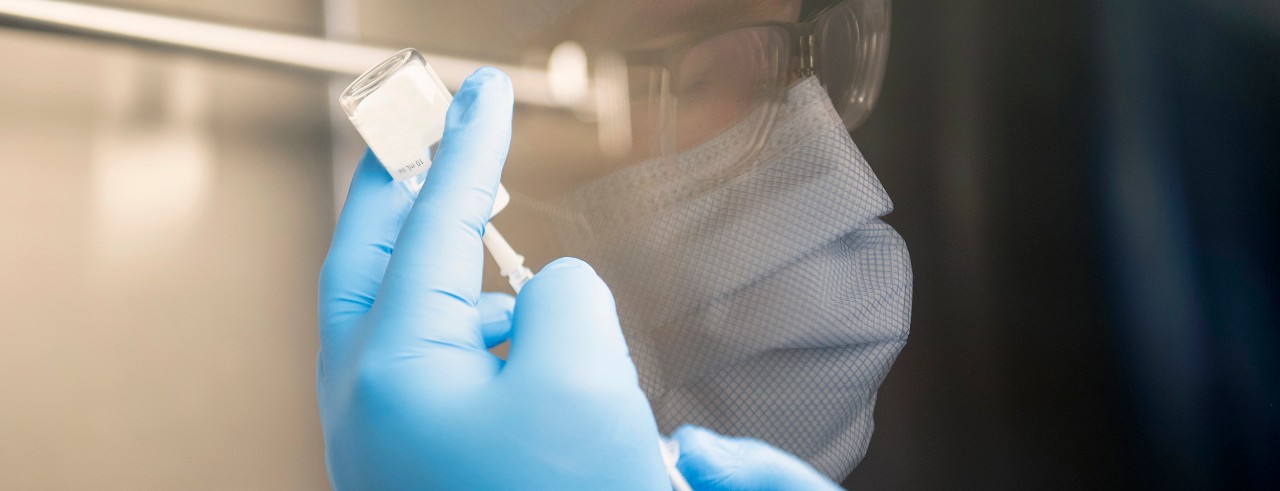
UC, UC Health administer first doses in COVID-19 vaccine trial
Phase 3 clinical trial will evaluate efficacy of Moderna vaccine candidate
Clinicians at the University of Cincinnati College of Medicine and UC Health have administered the first doses in a groundbreaking clinical trial that will evaluate the effectiveness of a vaccine for COVID-19, the respiratory illness caused by the novel coronavirus SARS-CoV-2.
The first patient to receive a dose in the study was Jarelle Marshall, 37, an IT professional who lives in Cincinnati.
“We’re all in this together. We all want to get things back open and get back to as normal as possible,” says Marshall, the father of a fourteen-year old son. “I try to always teach my son to walk the walk. You can say all these things and tell everybody something but to actually walk the walk and do what you say you’re going to do, and if you’re going to try to help people, you just do it.”

Jarelle Marshall, 37, an IT professional who lives in Cincinnati, was the first patient to receive the first dose in Cincinnati in a groundbreaking clinical trial that will evaluate the effectiveness of a vaccine for COVID-19, the respiratory illness caused by the novel coronavirus SARS-CoV-2. Photo/Colleen Kelley/UC Creative + Brand
We’re all in this together. We all want to get things back open and get back to as normal as possible.
Jarelle Marshall
The first doses were administered via syringe by licensed pharmacists, and study participants will receive a second dose in approximately one month.
Patients who participate in the blinded, randomized, placebo-controlled study will receive either the vaccine, or a placebo, in two injections. The vaccine is incorporated into the patient’s cells, which should begin producing a viral antigen to which the immune system can respond. Patients will keep a daily electronic diary of their symptoms, and also participate in telehealth and clinic visits with UC Health clinicians over a two-year period.

A pharmacist prepares the first dose, which was administered via syringe. Study participants will receive a second dose in approximately one month. Photo/Colleen Kelley/UC Creative + Brand

Jarelle Marshall signs consent forms during screening for the trial in Holmes Hospital on the UC Medical Campus, where the trial is being hosted. Photo/Colleen Kelley/UC Creative + Brand

Carl Fichtenbaum, MD, of the UC College of Medicine Division of Infectious Diseases. Photo/Colleen Kelley/UC Creative + Brand
"Providing our community an opportunity to become part of the solution to ending the COVID-19 pandemic is very important. [This trial] places Cincinnati squarely on the cutting edge of new scientific discoveries and allows our citizens to take action and help us find a preventive vaccine for COVID-19,” says Carl Fichtenbaum, MD, co-investigator and medical director of the study.
Fichtenbaum is a professor in the Division of Infectious Diseases in the Department of Internal Medicine at the UC College of Medicine and a UC Health physician.
Read more about the study and the first trial participant.
Featured photo by Colleen Kelley/UC Creative + Brand.
Impact Lives Here
The University of Cincinnati is leading public urban universities into a new era of innovation and impact. Our faculty, staff and students are saving lives, changing outcomes and bending the future in our city's direction. Next Lives Here.
Stay up on all UC's COVID-19 stories, read more #UCtheGood content, or take a UC virtual visit and begin picturing yourself at an institution that inspires incredible stories.
Related Stories
Study explores social media’s growing influence on cosmeceutical...
May 7, 2025
The University of Cincinnati's Kelly Dobos spoke with Cosmetics Design USA about new research that revealed a significant rise in consumer interest in cosmeceuticals, or cosmetic products with active ingredients purported to have medical benefits.
UC, UC Health see frontline student training as workforce...
May 6, 2025
Amid ongoing challenges across the health care workforce, including burnout and shortages, the University of Cincinnati is working to tackle this issue through a program that embeds students in clinical settings.
University of Cincinnati College of Medicine celebrates Class of...
May 6, 2025
The University of Cincinnati College of Medicine celebrated the Class of 2025 at its annual Honors Day, recognizing graduates' achievements, resilience through the COVID-19 pandemic and commitment to compassionate, innovative care. Highlights included a 100% Step 2 pass rate, top residency matches and powerful moments of reflection and recognition.
